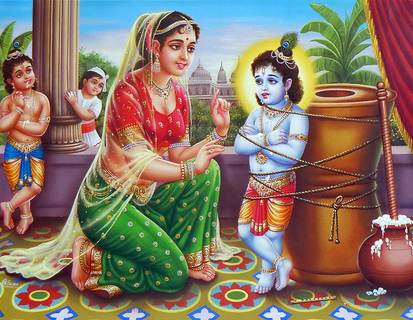|
|
JKYog
e-Magazine, Issue No. 89
|
|
|
Editor's Message  Dear Readers,
This edition of Sumiran is dedicated to the topic of 'Bhakti Enslaves God.'
Our first article titled "Bhakti Enslaves God" explains that
the Lord becomes a slave of his devotee when the devotee masters the
three tenets of bhakti: ananyata, nishkamta, and nirantara.
However, one can only love God when one's mind is attached to God. And
the mind can only be attached when one understands God. Thus, our second
article is titled "Who Can Understand God?"
This
past weekend, Swamiji successfully concluded the first 2018 retreat in
the USA! Follow his activities as we share the highlights from his tour
on the West Coast and BM contributions. Finally, enjoy our bhog recipe
of Date Nut Roll.
|
|
|
|
|
नाचें जाकी माया वश बड़े बड़े ज्ञानी जन |
सोइ गोपी छाछ पर नाचे नंदनंदन ||
Whose external potency, Maya, makes even the great impersonalists
dance to its tune - that same Nandanandan is made to dance by the gopis
for a handful of buttermilk.
- Jagadguru Shree Kripaluji Maharaj
|
|
|
 |
 |
Bhakti Enslaves God
So
far it has been explained that divine love of God is very difficult to
attain. It cannot be obtained by our effort alone, instead, it can only
be attained by the grace of God. We have also learned that the bliss of Premanand is more than a million times greater than the bliss of Brahmanand experienced by the jñānīs. Now let us attempt to understand why this is so.
In verse 6.47 of the Bhagavad Gita, Shree Krishna tells Arjun:
yoginām api sarveṣhāṁ mad-gatenāntar-ātmanā śhraddhāvān bhajate yo māṁ sa me yuktatamo mataḥ
"Of
all yogis, those whose minds are always absorbed in Me, and who engage
in devotion to Me with great faith, them I consider to be the highest of
all."
Shree Krishna declares the bhakti yogi to be the highest, superior to even the best aṣhṭāṅg yogi and haṭha yogi. That is because bhakti,
or divine love, is the highest power of God. It is such a power that
binds God and makes him a slave of his devotee. Thus, he states in the
Bhagavatam:
ahaṁ bhakta-parādhīno hyasvatantra iva dvija sādhubhir grasta-hṛidayo bhaktair bhakta-jana-priyaḥ 9.4.63
"Although
I am supremely independent, yet I become enslaved by my devotees. They
conquer my heart. What to speak of my devotees, even the devotees of my
devotees are very dear to me." The bhakti yogi possesses the power of
divine love and is dearest to God. Thus, he is considered to be the
highest of all yogis.
Such an instance of a devotee was Mother Yashoda. Not only did she have the power to address the Supreme Lord as "Lala!"
or "My son!" but she also ran after him in an attempt to tie him to the
mortar wheel. Who can tie the Almighty Lord who is capable of running
faster than the wind and is stronger than Indra's thunderbolt? And yet,
the Lord allowed himself to be enslaved by Yashoda's love. As a result,
she could successfully tie him.
In this verse, Shree Krishna has used the word bhajate. It comes from the root word bhaj,
which means "to serve." It is a far more significant word for devotion
than "worship," which means "to adore." Here, Shree Krishna is talking
about those who, not merely adore him, but also serve him with loving
devotion. They are thus established in the natural position of the soul
as the servant of God, while the other kinds of yogis are still
incomplete in their realization.
500 years ago, Chaitanya Mahaprabhu said the same thing:
jīver svaroop hay kṛiṣhṇer nitya dās
meaning,
we are the eternal servants of Shree Krishna. A true servant is one who
has learned to sacrifice his happiness for the Lord's happiness. In
doing so, one has mastered the three tenets of bhakti: ananyata (no other), nishkamta (selflessness), and nirantarta (constant remembrance). And it is only when one has perfected these three tenets that God becomes a slave of his devotee.
|
 |
Who Can Understand God?
It has been mentioned in the Vedic scriptures that one cannot understand God.
yasyāmataṁ tasya mataṁ mataṁ yasya na veda saḥ avijñātaṁ vijānatāṁ vijñātamavijānatām Kena Upanishad 2.3
"One who thinks God can be known does not understand. One who thinks that God cannot be known, actually understands."
Just
as a ray of light is incapable of understanding the nature of the sun,
and the wave is incapable of understanding the ocean from which it
originates, similarly, how can the anu or jeev ātmā (tiny soul) understand the Paramātmā (Supreme Soul)?
Some
are inclined to question this as we are taught to think of God as our
friend, father, or beloved. If one thinks of God as such a close
relative, then it appears strange that one does not know Him; after all,
one cannot love someone who is unknown. However, the Vedic scriptures
give six reasons as to why one cannot understand God.
First,
indriyebhyaḥ parā hyarthā arthebhyaśh cha paraṁ manaḥ manasastu parā buddhir buddherātmā mahān paraḥ
mahataḥ paramavyaktamavyaktāt puruṣhaḥ paraḥ puruṣhān na paraṁ kiñchit sā kāṣhṭhā sā parā gatiḥ
Kathopanishad 1.3.10-11 "The
sense objects are beyond the understanding of the senses, the mind is
beyond the understanding of the sense objects, the intellect is beyond
the understanding of the the mind, the soul is beyond the understanding
of the intellect, Maya is beyond the understanding of the the soul, and
God is beyond the understanding of Maya."
In verse 13.16 of the Bhagavad Gita, Shree Krishna explains to Arjun, sookṣhmatvāt tad avijñeyaṁ doorasthaṁ chāntike cha tat
"He is subtle, and hence, He is incomprehensible."
Understand
that the origin or source of any material which has a form is subtler
and longer lasting than the object itself. For instance, the yarn or
thread from which cloth is made is subtler than the fabric itself.
Similarly, God is far more subtle and permanent compared to the
individual souls. If the gross mind and intellect cannot understand the
individual soul that is subtler than itself, then how can they
understand the subtlest entity that exists?
Second,
divyohyamoortaḥ puruṣhaḥ Vedas
"God is divine, and the senses, mind, and intellect are material." Our
gross body, is made from the five material elements of earth, water,
fire, air, and space. Therefore, it is material in nature. The senses,
mind, and intellect, while subtler than the gross body, are also made
from God's material energy. Thus, they are also material. According to
the Vedic scriptures, God is divine. Then, how can the material
understand the divine?
Third,
tameva bhāntamanubhāti sarvaṁ tasya bhāsā sarvamidaṁ vibhāti Kathopanishad 2.2.15
"He is the Supreme illuminator, and the senses, mind, and intellect are
illumined by Him." Only when He illumines the senses, mind, and
intellect can one understand Him.
Fourth,
yanmanasā na manute yenāhurmano matam tadeva brahma tvaṁ viddhi nedaṁ yadidamupāsate Kena Upanishad 1.5
"It is through inspiration from God, that the senses, mind, and
intellect perform their various functions." While we have a free will to
choose and make decisions, He alone provides the inspiration to think
and act. Since our senses, mind, and intellect are inspired by Him, by
their own energy, they can never comprehend their Inspirer.
Fifth, God is an abode of various, simultaneously existing contradictory qualities.
aṇoraṇīyān mahato mahīyān ātmā guhāyāṁ nihito'sya jantoḥ tamakratuṁ paśhayti vītaśhoko dhātuḥ prasādān mahimānamīśham Śhvetāśhvatara Upanishad 3.20 He
is smaller than the smallest and larger than the largest. He is lighter
than air and heavier than anything one can imagine. Since it is beyond
one's ability to exhibit such behavior, how is it possible to understand
someone who not only exhibits contradictory qualities and attributes,
but also exhibits them simultaneously?
Sixth, the Vedas refer to Brahman or the Supreme Being as possessing three aspects, all of which are unknowable.
etajjñeyaṁ nityamevātmasaṁsthaṁ nātaḥ paraṁ veditavyaṁ hi kiñchit bhoktā bhogyaṁ preritāraṁ cha matvā sarvaṁ proktaṁ trividhaṁ brahmametat Śhvetāśhvatara Upanishad 1.12
Bhoktā Brahman or the enjoyer are all the individual souls or jeev. They are a part of an energy of God. As a part, they are incapable of understanding the whole. Bhogya Brahman is referred to as that which is enjoyed or Maya. This too is an energy of God. It has three aspects to it: sattva guna (mode of goodness), rajo guna (mode of passion), and tamo guna (mode of ignorance). Preraka Brahman refers to God Himself.
If
these three aspects are known, then one can be freed from Maya, but
they are unknowable as they are beyond the comprehension of the human
intellect.
However, in verse 10.11 of the Bhagavad Gita, it is explained that the jeev ātmā can only understand God when He grants the soul His śhuddha sattva energy. Thus, it is only on the basis of God's divine energy that can one understand Him.
And, in verse 18.55 of the Bhagavad Gita,
Shree Krishna explains that the secret of the personal form cannot be
known through karm, jñāna, aṣhṭāṅg yog, etc. The mystery of God's form,
virtues, pastimes, abode, and associates can only be comprehended
through unalloyed devotion. The devotees understand God because they
possess the eyes of pure love. Thus, it is love alone that opens the
door to the impossible and makes way for the inaccessible. And that's
why only his devotees can understand him.
|
JKYog 2018 Retreats and Hindu Family Camp
|
|
|
|
|
The
recently concluded JKYog West Coast retreat 2018 was a blissful,
divinely blessed time for all who were fortunate to attend. Devotees
lost themselves in the nectar of the Narad Bhakti Darshan lectures
delivered by H H Swami Mukundananda and danced with joyous abandon
during the ecstatic chanting sessions. Of note also were the beautiful
bhajan and classical dance performances by the talented retreat
attendees that filled the audience with the emotions of devotion. When
the retreat ended, people were spiritually recharged yet sad to leave
and longing for more as evidenced by the numerous testimonials.
Every retreat with
Swami Mukundananda is an opportunity like no other for the whole family,
to deepen and solidify the relationship with God without external
disturbances. JKYog provides accommodation and meals at cost. The
children and teenagers have their own parallel volunteer run sessions,
while the parents enjoy the bhajans and lectures worry free. Children up
to the age of 11 are enrolled in the Bal Mukund program where they are
taught arts and crafts, spiritual values and play fun games. Older
children attend the youth program consisting of Bhagavad Gita classes,
music classes, team games and communication and leadership coaching. The
children and youth are given the opportunity to exclusively interact
with Swamiji and ask him questions. The youth get to display their newly
learned vocal, dholak, cymbals, shaker and harmonium skills to the
retreat audience.
If you
are feeling bad about a missed opportunity to attend a JKYog retreat,
cheer up because there are at least two more spiritual treats being
offered by JKYog this year:
The icing on the cake of spiritual getaways is the brand new JKYog Hindu Family Camp at the Radha Krishna Temple of Dallas
from July 4 - July 10. Packed with exciting activities for adults and
children alike it promises to be a whirlwind week of fun for the whole
family in the uplifting spiritual company of our beloved Swamiji! Soak
in the bliss of divine kirtans, meditations, and enlightening lectures
by Swami Mukundananda and Jagadguru Shree Kripaluji Maharaj. Participate
in the intimate, light hearted Mehfils with Swamiji. Adult music
classes are being offered for those who want to learn music. Kids have
tons of activities to choose from ranging from music, theater, spiritual
wisdom and painting classes to personality development and volunteer
opportunities.
As you can see you are spoiled for choice this year in terms of the spiritual opportunities to relax, recharge and rejoice.
The
scriptures say one must never delay the performance of a good deed. So,
what are you waiting for? Hurry and Register today for JKYog Retreats
and Hindu Family Camp - transform your life spiritually and never look
back.
|
Are you looking forward to the very best family camp for the upcoming 2018 summer?
|
|
You're invited!
July 4th, 2018 (Wednesday) 7:00 am to
July 10, 2018 (Tuesday) 10:00 pm
Last
summer, the grand inauguration of Radha Krishna Temple in Allen was
celebrated and this summer, we are very excited to bring to you our very
first week-long JKYog Hindu Family Camp from July 4 - 10, 2018.
Between
the specially designed creative programs for children and youth, the
variety of wonderful activities offered for adults, and the divine
presence of H.H. Swami Mukundananda ji, we assure you that it will be
your favorite family trip of 2018! What a great way for parents and
children to rejuvenate their devotion and make sweet memories in the
gorgeous Radha Krishna Temple setting!
Registration Fee: $150/person for whole week
|
 |
| Daily Sadhana- Spiritual Practice Made Easy! | |
Daily Sadhana is a unique online service which
allows spiritual seekers to acquire spiritual
knowledge anywhere, anytime, and at your own pace!
|  |
|
|
|
Power of Bhakti - Love that Binds Almighty God
Watch this video where Swamiji explains the power of bhakti. Bhakti is so powerful that it enslaves God too.
In this video, Swamiji explains that Krishna grants the devotee his swaroop shatyanand bliss. He then relishes the same bliss by sitting within their hearts.
This swaroop shatyanand bliss is higher than the bliss he experiences himself (swaroop anand). In this manner, he bestows upon his devotee a higher status. And since the bliss of swaroop shatyanand is higher than that of swaroop anand, he gets enslaved by it as well.
|
For more spiritual inspiration, please click below to subscribe to
JKYog YouTube channels for videos in English and Hindi!

|
|
|
Phoenix, AZ was the first city to host Swamiji this year! Swamiji
started the week long program tour with a narration of the Ram Katha.
Local devotees were very excited to have Swamiji in their midst for the
actual Ram Navami celebration!
Pasadena, CA had the honor of
being the city where Swamiji inaugurated his lecture series for the
year, "Seven Divine Laws for Happiness and Fulfillment." The topic was
received enthusiastically as the temple hall was packed everyday.
Swamiji
continued the West Coast tour with the Bay Area. The topic of Seven
Divine Laws for Happiness and Fulfillment was also presented here.
People listened attentively as Swamiji explained with humorous stories
and real life examples.
Swamiji narrated the Shreemad Bhagavad
Katha in the Veda Temple at Milpitas, CA from April 14-18. The audience
listened with rapt attention to the Bhagavad stories. Krishna janam
was celebrated with much singing & dancing on the last day.
Devotees of the Bay Area and Pasadena, CA enjoyed a morning
walk with Swamiji on the first Sunday. They were grateful to have him in
their midst. As usual, the newcomers were full of questions for
Swamiji.
|
|
|
|
|
| |
Apr 28 to May 4
|
Kendall Park, NJ
| |
|
Chalfont, PA
| |
May 12 to 18
|
Chantilly, VA
|
|
|
May 19 to 24
|
| |
May 26 to 28
|
East Coast Retreat
| |
Jun 2 to 8
|
Tampa, PA
| |
Jun 9 to 15
|
Morrisville, NC
|
|
|
Bring
spirituality closer to you and your family. Spend quality time
nourishing the body, mind, and soul in the inspiring company of Swami
Mukundananda
East Coast Retreat
Memorial Day Weekend (May 26-28)
Feasterville-Trevose, PA
|
|
|
JKYog Presents
Bal-Mukund
Personality Development Classes for Children
| |
|
|
Bay
Area Bal-Mukunds put together a special performance in front of H.H.
Swami Mukundananda ji! The hall was full of color and excitement as the
kids dressed up as Radha and Krishna danced and exhibited their talent!
|
|
|
|
|
Date Nut Roll
|
Ingredients:
- 2 cups Mejdool dates
- 1/4 cup dry milk power
- 1/2 cup pistachio cut in halves lengthwise
- 1/2 cup almonds crushed in small pieces
- Pinch saffron
| 
|
Method:
Remove pits from the dates. In a nonstick pan medium heat, cook
dates until it starts melting. Stir in dry milk, pistachio, and almonds.
Cook for five minutes.
Cool for few minutes until you are able to roll by hand. Put the
mixture into a flat surface and spread by hand. The thickness should be
about 1/4" and width should be about 2 inches. Roll it until it looks
like a tube. Put it in the freezer. Cut into 1/2 inch round circles.
|
|
Contact us
|
The Editor JKYog: XVII/3305, 1st Floor
Ranjit Nagar (Near PUSA)
New Delhi - 110008, India
|
7405 Stoney Point Dr, Plano
TX 75025, USA
|
|
|
|
|
|
Copyright © Jagadguru Kripaluji Yog 2018. All rights reserved. Reserved.
|
|
|
|